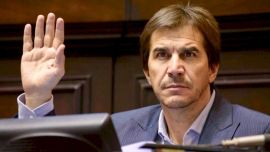The Mercosur bloc could be on the verge of historic changes, after member nations agreed this week to debate a potential liberalisation of its trade rules at a key meeting next month Talks over a reduction in the common external tariff could also be on the table.
The news was announced by the Foreign Ministries of Argentina and Uruguay jointly last Monday following a virtual extraordinary meeting to broach these two issues presented by the government in Montevideo.
"The Uruguayan proposal will be studied by the Common Market Group co-ordinators with the aim of producing the inputs for decision-making at the next meeting of the Common Market Council," reported the Uruguayan Foreign Ministry via Twitter.
Occupying the Mercosur presidency in the first half of this year, Argentina indicated in a communiqué that as regards review of the common external tariff (as promoted by Brazil) it proposes "to reach convergence over the proposals of the member states during this half of the year."
"We must think about what capacities the different sectors of the economy have to put up with a lower common external tariff and what a unilateral reduction implies for external negotiations," declared Foreign Minister Felipe Solá.
As for making the negotiations with other countries or trade blocs more flexible, as pushed by Uruguay, Argentina’s approach is "at the end of this half of the year to elaborate a proposed plan of external negotiations identifying the priorities of Mercosur’s external agenda along with specific [trade] offers, as well as a complete report on the state of the different negotiations," read the communiqué.
Making a start to this debate is considered an achievement by Uruguay.
"We feel satisfied (...) It was a good meeting. Tense, of course, but good in the end," commented Uruguayan Foreign Minister Francisco Bustillo. "This is the first time in 20 years that we have managed to place this issue on the table. Everything we achieve in terms of flexibility will not only benefit Uruguay but everybody."
Bloc split
Both a lower common external tariff and greater flexibility allowing trade agreements to be reached without the consensus of all four Mercosur members are divisive issues.
At the Monday meeting Uruguay enjoyed Brazilian support while Paraguay lined up behind Argentina’s position.
"With the total support of Brazil, Uruguay’s proposals regarding greater flexibility and the common external tariff have formally entered Mercosur," the Uruguayan Foreign Ministry celebrated via Twitter.
Meanwhile Paraguayan Deputy Foreign Minister Raúl Cauno, who covers economic relations and integration, expressed his country’s agreement with Argentina insofar as flexibility and the tariff "are two different instances which cannot be in the same instrument because they have particular features and a different impact."
"Brazil and Uruguay are saying: 'Gentlemen we’re not meeting our commitment to integrate with the world and we want you to give us the opportunity to negotiate as a quartet, trio, duo or individually...," Cauno told AFP while adding: "[The Uruguayan proposal] is not the right way because it attacks the fundamentals of a customs union, which is the prior stage to forming what we want to achieve – a common market."
President Alberto Fernández clashed fiercely with his Uruguayan counterpart Luis Lacalle Pou at the last Mercosur Summit on March 26 owing to antagonistic positions over making the trade bloc more flexible.
At that time the Uruguayan leader maintained that Mercosur "cannot be ballast" preventing the commercial advance of his country, to which Fernández retorted that if Argentina is considered ballast, "then take another boat."
Mercosur, created 30 years ago, requires consensus for its decisions, which Uruguay now vehemently questions.
"Unless everybody agrees, Mercosur does not advance. That’s exactly the point we’re proposing to attack directly – those who do not want to advance for whatever reason should make way for other partners to advance," said Uruguayan President Lacalle Pou last Monday.
While recognising differences between the countries integrating the regional bloc, Economy Minister Martín Guzmán said this see that Argentina wants to “see points of agreement and the important thing is to go building on those points to advance towards a more modern Mercosur adapted to the need of our nations to develop.”
“We agree that integration is of fundamental importance but integration as a means, not an end,” said the minister at last Monday’s regional bloc meeting in which he participated alongside with his colleagues from Uruguay, Paraguay and Brazil.
"We agree that Mercosur was dormant and it’s important to wake up Mercosur. Here it is waking up and it’s important that we advance on the basis of consensus, recognising the historic moment of the pandemic which we are experiencing," underlined the minister.
“Prosperity for us [Argentines] is a route to development which includes a productive and more competitive dynamism with greater productivity but fundamentally of benefit to everybody in our population. That means growth being inclusive and accompanied by equal distribution of the benefits of that growth. That growth should come within a framework of stability, thus permitting the development process continuity in time,” he said.
The road to development followed by nation-states “opposes the idea of an invisible hand which solves problems by itself,” he pointed out in reference to economic theories based on the market.
He highlighted that increasing exports “is a necessary condition for our countries having sustainable economic development and domestic markets.”
Within this framework he stressed that Mercosur’s development agenda “has to face the problem of environmental sustainability.”
Guzmán assured that “as a bloc we owe ourselves a deeper discussion as to the propitious path towards the prosperity of our peoples.”
Integrating value chains “is fundamental for greater levels of productivity and to be able to raise the levels of exports. That’s something we owe ourselves as a bloc.”
And as a bloc, “integration with the rest of the world will be more positive if environmental sustainability is borne in mind when designing our policies.”
Guzmán stated: “There is great value in working as a bloc but we need to recognise that there are asymmetries. Argentina recognises the different situations being undergone by different countries of the bloc. That’s why it’s important to recognise the need for flexibility in dealing with those situations. But it is fundamental not to forget that we think of integration as a means towards the end of development. We need to understand integration in terms of what it gives and what it takes away in terms of jobs, improved productivity and macro-economic stability as we need to do with each one of the trade policies we propose as a bloc.”
Guzmán pointed out that in all countries considered “successful” in economic terms “the state has a very important role designing policies to govern trade, increase productivity, create jobs and maintain a certain equilibrium.”
The minister described the pandemic "as an unprecedented shock in the history of modern capitalism, causing us huge uncertainty. That’s why we must make economic and trade policies as a bloc, understanding this uncertainty to be present and that in order to take firmer steps we need to go building with a responsible and balanced audacity, placing emphasis on the points in which we are in agreement."
The Argentine position, Guzmán concluded, "has similarities and differences with those of other bloc members but seeks to construct balances creating conditions of greater prosperity and fostering responsible conduct. We consider that not advancing and not doing anything would be counterproductive."
Tariff reduction?
Upon inaugurating Monday’s XII Extraordinary Meeting of the Common Market Council (a summit of Mercosur foreign ministers), Solá presented Argentina’s proposal to reduce the Common External Tariff as "a proposal to reduce the Common External Tariff as an average but using a methodology of segmentation between agro-industrial products, industrial output, capital goods, software and telecommunications with five differential scales according to the degree of processing in each case, on which basis greater reductions will be recommended for raw materials and less for finished goods."
The Common External Tariff is levied on all products of countries outside the regional market seeking to enter.
Solá also ratified Argentina’s posture in favour of jointly dealing with other countries and blocs in Mercosur’s relations on the basis of the regional bloc’s current commercial priorities.
Meanwhile Uruguay used the occasion to finally present formally its initiative to make both the Common External Tariff and relations with third countries or blocs more flexible, allowing for future negotiations of trade agreements with the latter to be "explored" without need for the joint participation of all Mercosur members.
In legal terms, this would imply amending Decision 32 of the Common Market Council from the year 2000 whose Article 1 reaffirmed "the commitment of the states forming Mercosur to negotiate jointly all agreements of a commercial nature with countries or groupings outside the zone granting preferential tariffs."
This could mean a new political and institutional fabric for Mercosur.
Brazilian Economy Minister Paulo Guedes backed the Uruguayan proposal but Itamaraty (the Brazilian Foreign Ministry) was more cautious, according to Foreign Ministry sources. Brazil is also pushing for deeper cuts in the Common External Tariff than contemplated by Argentina.
At Monday’s meeting, Solá insisted that "Argentina has the will to achieve consensus."
The Argentine proposal, which was anticipated in general terms a fortnight ago, contemplates the reduction of the Common External Tariff on a total of 1,900 items while eliminating it altogether for capital goods and accessories from the current two percent.
The Uruguayan initiative contemplates all tariffs being reduced by around 10 percent this year and by a similar percentage next year, as well as allowing external relations to be pursued individually by each country without needing the approval of the whole bloc.
The negotiations will be continuing this month with a new meeting of Common Market Group coordinators and with a face-to-face encounter of foreign ministers in this city, in accordance with Argentina’s presidency of the bloc in the first half of this year.
Ministers Matías Kulfas (Productive Development) and Luis Basterra (Agriculture) were also present on Monday alongside Solá and Guzmán.
The clashes over these issues (the Common External Tariff and external relations) gathered force last year when Brazil and Uruguay pushed the idea of advancing rapidly in free trade agreements with countries like South Korea, Canada, India, Singapore and Lebanon.
In reply, Argentina considered it necessary to "put the brakes" on these negotiations due to "the international uncertainty and the situation of our economy."
Nevertheless, the discussions over external relations and tariffs do not represent any historic novelty for the trade bloc since there have been various episodes since it was founded on March 26, 1991.
– TIMES/AFP/NA























Comments